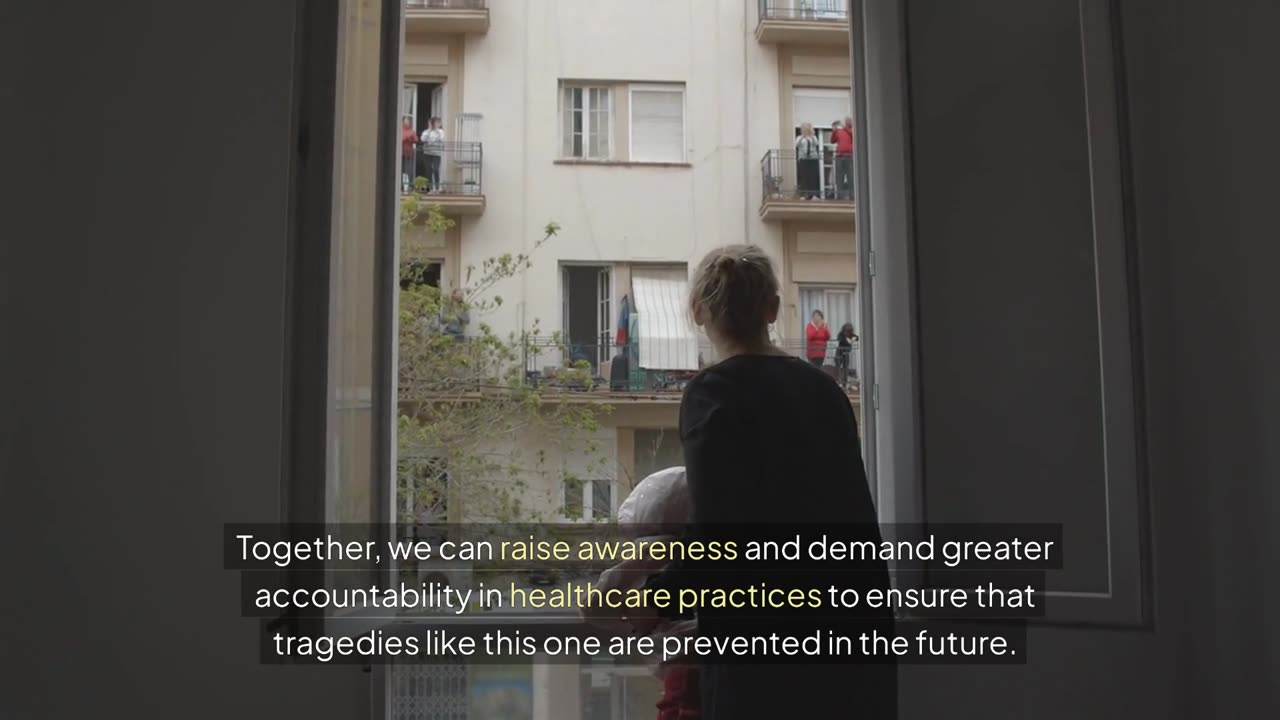Premium Only Content

Alexis Lorenze’s Life-Threatening Vaccine Reaction Sparks Debate
**Title: A Fight for Survival: Alexis Lorenze’s Life-Threatening Vaccine Reaction Sparks Debate**
**Introduction: A Routine Hospital Visit Turns Tragic**
What was meant to be a routine hospital visit has turned into a life-or-death battle for 23-year-old Alexis Lorenze. Diagnosed with a rare blood disorder known as Paroxysmal Nocturnal Hemoglobinuria (PNH) earlier this year, Alexis sought treatment at UCI Medical Centre in California. But after receiving a series of vaccines deemed necessary for her continued care, her health took a terrifying turn. Within just ten minutes of being vaccinated, Alexis began experiencing extreme reactions that left her temporarily blind, unable to move her jaw, and vomiting uncontrollably.
Now fighting for her life, her story raises important questions about vaccine safety, informed consent, and the risks associated with healthcare protocols.
---
### **The Rare Diagnosis: Understanding Paroxysmal Nocturnal Hemoglobinuria (PNH)**
Before her life-threatening reaction, Alexis Lorenze had already been grappling with the severe and rare condition known as Paroxysmal Nocturnal Hemoglobinuria (PNH). PNH is a blood disorder in which red blood cells break down prematurely, leading to a cascade of dangerous symptoms, including blood clots, kidney damage, and fatigue. Diagnosed in January of this year, Alexis was undergoing treatment to manage her PNH, which included blood transfusions and medication to help prevent further complications.
For patients like Alexis, hospital visits are a critical part of their care. PNH requires ongoing monitoring, and in some cases, patients are advised to receive certain vaccines to prevent infections that could further weaken their already compromised immune systems. But in Alexis’s case, what was supposed to be a step toward better health became the catalyst for a medical nightmare.
---
### **The Vaccine Reaction: When Care Takes a Dangerous Turn**
On the day of her hospital visit, Alexis was administered three vaccines—Tetanus, Pneumococcal, and Meningitis—supposedly to protect her as part of her ongoing treatment plan. However, shortly after receiving the injections, her health spiraled out of control. Temporary blindness, vomiting, and muscle paralysis followed, leaving Alexis in an alarming state within just ten minutes.
Her family and supporters have since claimed that the vaccines triggered this dramatic downturn, questioning whether proper care and precautions were taken before administering the doses. As the Vaccine Safety Research Foundation (VSRF) steps in to investigate, the incident has drawn attention to the potential dangers of vaccine reactions, particularly in patients with underlying health conditions like Alexis’s.
---
### **The Power of Social Media: Alexis’s Viral TikTok Journey**
In a world where medical crises often play out behind closed doors, Alexis’s story has gained visibility through a series of disturbing TikTok videos. Using the platform to document her ordeal, Alexis has shared footage of herself in the aftermath of the vaccine reaction, revealing a shocking display of bruising, swelling, and inflammation. Her swollen eyes, purple bruises, and visibly inflamed skin have not only shocked her followers but also sparked a larger conversation about vaccine safety and the role of informed consent in healthcare decisions.
Her videos have become a rallying cry for many who feel that patient safety is sometimes compromised in the rush to follow medical protocols. With thousands of views, comments, and shares, Alexis’s story has resonated with people from all walks of life, amplifying her plea for support as she fights for survival.
---
### **The Role of Vaccine Safety: Risks, Realities, and Responsibilities**
While vaccines have been heralded as life-saving medical advancements, incidents like Alexis’s serve as stark reminders that no medical procedure is without risk. It’s essential to acknowledge that severe reactions are rare, but they do happen—and when they do, they can have devastating consequences.
Alexis’s case raises important questions: Did the healthcare providers at UCI Medical Centre assess her risk thoroughly before administering the vaccines? Could alternative treatments have been considered? And, perhaps most crucially, was Alexis given full and adequate information about the potential risks she faced?
The Vaccine Safety Research Foundation (VSRF) has been quick to respond, sending a team of medical professionals, including Registered Nurse Angela Wulbrecht, to assist in Alexis’s care. Their involvement speaks to the growing concern about how healthcare providers handle adverse vaccine reactions, especially in vulnerable populations like those with rare blood disorders.
---
### **The Aftermath: Legal and Medical Consequences**
As Alexis continues her battle for life, her family has launched a fundraiser to help cover the costs of her specialized care at a private hospital in Los Angeles. Without health insurance in California, Alexis faces mounting medical bills and a long road to recovery—if she survives this ordeal.
In the wake of her rapid health decline, Alexis’s family has pointed fingers at the hospital, alleging that the vaccines were the direct cause of her current condition. The situation has now garnered the attention of legal and medical experts alike, who are beginning to question whether UCI Medical Centre acted appropriately in administering the vaccines without fully considering her medical history.
This isn’t just a personal crisis for Alexis and her family; it’s a case that could have far-reaching implications for vaccine safety protocols in hospitals across the country. With VSRF involved and public interest growing, this situation may lead to changes in how patients with complex medical conditions are treated moving forward.
---
**Conclusion: A Call for Awareness and Advocacy**
Alexis Lorenze’s heartbreaking story serves as a cautionary tale for patients and healthcare providers alike. While vaccines play a crucial role in public health, it is vital that each patient’s unique medical history and circumstances are carefully considered before administering any treatment. In Alexis’s case, the failure to do so may have led to a devastating, life-threatening reaction—one that could have potentially been avoided.
As Alexis continues to fight for her life, her journey is a powerful reminder of the importance of informed consent, patient advocacy, and the need for transparency in the medical world. Her TikTok videos have made a profound impact, bringing attention to an issue that many patients face but rarely speak about: the risks of adverse reactions to medical treatments and the need for better safeguards in hospitals.
If you’ve been moved by Alexis’s story, consider sharing this article, subscribing to stay informed on her recovery, and leaving your thoughts in the comments below. Let’s continue the conversation about patient safety and the changes needed to protect vulnerable individuals in our healthcare system. Every voice counts.
-
 LIVE
LIVE
Inverted World Live
2 hours agoHarvard Astronomer Says Hostile Alien Spaceship Heading Toward Earth | Ep. 82
5,972 watching -
 LIVE
LIVE
Laura Loomer
2 hours agoEP135: Champagne Communism: Zohran Mamdani's Ugandan Compound EXPOSED
771 watching -
 28:39
28:39
The Why Files
3 days agoCryptids Vol. 4 | Bunyips, Yowie and Australian Nightmare Fuel
18.2K35 -
 1:07:06
1:07:06
Mike Rowe
18 days agoThe Fight For America's Heartland | Salena Zito #442 | The Way I Heard It
14.6K44 -

TimcastIRL
2 hours agoSouth Park Goes FULL CHARLIE KIRK, Latest Episode ROASTS Trump Again | Timcast IRL
163K41 -
 LIVE
LIVE
SpartakusLIVE
3 hours agoThe Return of the KING of Content
489 watching -
 10:05
10:05
MattMorseTV
6 hours ago $2.97 earnedHe actually did it...
22.2K12 -
 LIVE
LIVE
Anthony Rogers
1 day agoEpisode 376 - Todd Schowalter
68 watching -
 LIVE
LIVE
megimu32
2 hours agoOTS: Movie Tie-In Games + Remakes: Let’s Play Memory Lane
139 watching -
 LIVE
LIVE
Adam Does Movies
10 hours ago $0.18 earnedTalking Movies + Ask Me Anything - LIVE
65 watching